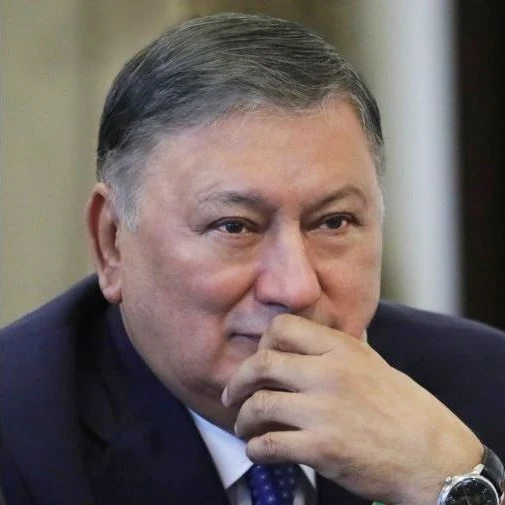Publications
The Port of Baku Facilitates Trans-Eurasian Commerce  By Vusal GULIYEV, Policy Advisor at the Center of Analysis of International Relations and Head of Shanghai Office at AZEGLOB Consulting Group
By Vusal GULIYEV, Policy Advisor at the Center of Analysis of International Relations and Head of Shanghai Office at AZEGLOB Consulting Group
In December 2024, Azerbaijani President Ilham Aliyev authorized a $12 million investment into the Port of Baku to initiate the second phase of its expansion. This phase aims to increase the port’s annual cargo capacity from 15 million to 25 million tons. The region’s ongoing geopolitical instability, largely due to Russia’s full-scale invasion of Ukraine and the ensuing Western sanctions, has disrupted its established trade routes. These geopolitical upheavals underline the importance of Azerbaijan’s position between Europe and Asia as a transit state via the Port of Baku. Azerbaijan’s flagship port is capitalizing on its strategic location along the Silk Road to become a key hub for east–west connectivity. READ MORE
Publications
Growing Footprint of the Turkish Capital in China  By Vusal GULIYEV, Policy Advisor at the Center of Analysis of International Relations and Head of Shanghai Office at AZEGLOB Consulting Group
By Vusal GULIYEV, Policy Advisor at the Center of Analysis of International Relations and Head of Shanghai Office at AZEGLOB Consulting Group
Over the past three decades, Turkish investment in China has steadily expanded, covering sectors such as energy, manufacturing, retail, and food. Despite certain market challenges, companies like Aksa and TAB Gıda have found scalable success. Backed by institutional frameworks, Türkiye’s strategic pivot to Asia continues to strengthen and diversify its economic relationship with China’s vast and growing market.
Economic relations between Türkiye and China have expanded considerably over the past three decades, evolving beyond trade to encompass mutual investment. While Chinese investments in Türkiye have typically drawn more attention, Turkish capital flowing into China has also steadily increased. Although Turkish investments remain less diversified and extensive than their Chinese counterparts, several Turkish companies have made notable contributions across multiple sectors. Nevertheless, China’s vast consumer base and industrial ecosystem have long been seen as a strategic target for Turkish businesses seeking to enhance their global reach. READ MORE
Publications
Azerbaijan’s Contribution to Regional Connectivity  By Vusal GULIYEV, Head of Shanghai Office at AZEGLOB Consulting Group and Policy Expert at the Baku-based Topchubashov Center
By Vusal GULIYEV, Head of Shanghai Office at AZEGLOB Consulting Group and Policy Expert at the Baku-based Topchubashov Center
Azerbaijan is transforming into a key regional hub through strategic investments in transportation infrastructure, particularly along the Middle Corridor. Expanding rail, maritime, and digital connectivity, the country enhances trade between Europe and Asia. Projects like the Baku-Tbilisi-Kars railway and Port of Baku solidify Azerbaijan’s role in global logistics and economic diversification.
Azerbaijan’s focus on improving transportation infrastructure has been central to its role in enhancing regional connectivity, especially in the broader context of linking Europe and Asia. As part of the effort to revive the historic Silk Road, significant progress has been made in expanding trade and transportation networks—particularly rail and maritime routes that facilitate intercontinental trade along the east-west corridor. This expansion is a critical aspect of Baku’s long-term socio-economic growth strategy. Azerbaijan has consistently prioritized unlocking the trade potential of the Trans-Caspian routes, investing in advanced logistics and transportation infrastructure, including rail lines, highways, and seaports, supported by both domestic and international development initiatives. READ MORE
Publications
Turkish - Chinese Rapprochement: Growing Chinese Investment in Türkiye  By Vusal GULIYEV, Head of Shanghai Office at AZEGLOB Consulting Group and Policy Expert at the Baku-based Topchubashov Center
By Vusal GULIYEV, Head of Shanghai Office at AZEGLOB Consulting Group and Policy Expert at the Baku-based Topchubashov Center
Although Turkish - Chinese diplomatic relations periodically capture the global agenda due to their fragile aspects, examining the dynamics of economic relations in recent years reveals a different picture. While official Turkish - Chinese relations have been ongoing since 1971, the intensification of mutual economic cooperation dates back to the 2010s. Particularly, with the implementation of China’s Belt and Road Initiative (BRI), which encompasses 140 countries including Türkiye, the number of joint economic collaborations within the framework of international projects between the two countries has increased. Thanks to joint commercial projects carried out in recent years, China has become one of Türkiye’s largest investors and creditors. Chinese multinational companies continue to rapidly invest across various sectors of the Turkish economy. This article systematically analyses the commercial interests and investments of China, which has become one of the world’s largest investors and creditors, in Türkiye, considering the political-economic factors shaping Turkish - Chinese economic relations. READ MORE
Publications
Uzbekistan exports its products to 115 countries  Export is a key driver of the economy, enabling the development of production, the creation of new jobs, and the growth of GDP. For this reason, every state seeks to support enterprises aiming to expand their exports to international markets. This article explores the comprehensive measures of direct support for exporters in Uzbekistan.
Export is a key driver of the economy, enabling the development of production, the creation of new jobs, and the growth of GDP. For this reason, every state seeks to support enterprises aiming to expand their exports to international markets. This article explores the comprehensive measures of direct support for exporters in Uzbekistan.
Export support in Uzbekistan is carried out systematically, strictly adhering to the goal set in the Uzbekistan 2030 Strategy — increasing the share of the private sector in exports to 60%.
Here are some indicative figures: from 2017 to 2023, Uzbekistan’s total exports reached $120 billion. In 2023 alone, export volumes amounted to $24 billion, marking a 64% increase compared to 2017.
READ MORE
Publications
The awakening lion: the era of renewal  Hey, great Turan, land of lions!
Hey, great Turan, land of lions!
What has become of you? What are these days you endure now?
Oh, glorious cradle of Genghis, Timur, Oghuz, and Attila!
Where have the esteemed seats you once held gone?..
Abdurauf Fitrat
An American politician once said of the current life and fate of the Central Asian region: ‘They are neither post-Soviet nor post-communist countries now’.
Today no specialist knowledge is needed to understand this idea, which suggests that such labels are outdated in the research community. For example, ten to fifteen years ago the political behaviour of Central Asian societies – neighbours for thousands of years – was prone to national separatism, mutual dislike and latent hostility, but today they have undergone a remarkable transformation. Ideologues and ordinary Central Asians only a couple years ago endeavoured to prove their superiority, their antiquity and, for these very reasons, their greater belonging to the historical and cultural heritage of the region. Though they still might hurl some sharp insults at each other, now they have become united neighbours.
READ MORE